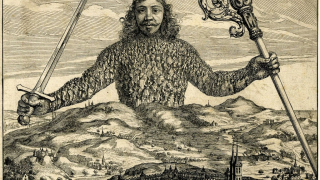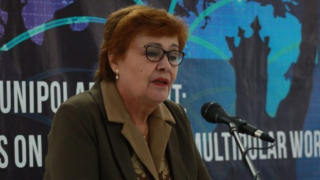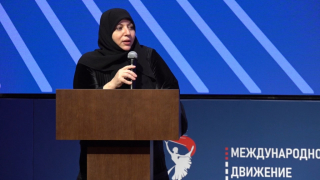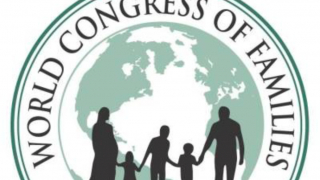Traditionalism after 2016
The March 29-31, World Congress of Families. Between speakers - Italy’s vice premier Matteo Salvini, President Igor Dodon of Moldova, and Syriac Catholic Patriarch Ignace Younan III.

Full speech of Levan Vasadze
Good morning!
What a pleasure to be here! I feel very much at home, every time I come to Italy. In Soviet days, Georgia was referred to as Italy of Soviet Union, thanks to its wine, food, beaches and mountains, musical culture and southern temperament. I, as a Georgian patriot who loves Italy, would of course reciprocate the compliment and say that it is actually the other way around, Italy is Europe’s Georgia, and this is the best compliment I can render for our generous hosts.
Having hosted this congress three years ago in Tbilisi, how time flies, let me share some experiences of how the congress has affected our country in its aftermath. Many traditionalists in Georgia (I’m not a big fan of the term ‘conservatism’ as I believe living the eternal tradition is more important than conserving an outdated one) state that it was actually the WCF X that changed the course of events in our country. The flank of traditionalist NGO’s, bloggers and activists has grown dramatically since and although we still have a long way to go to the happy day of a complete victory over the sorosist demons, the fact of a large international forum like this obviously gave a very reassuring impulse to my compatriot traditionalists, who (a) found out that they are not alone and (b) have discovered through the international guests of the congress that not all American and western European people are cynical perverts. Thus, I believe this congress will have a similar impact on Italy’s pro-life culture and family movement and I’m here to congratulate our Italian friends and organizers with this remarkable achievement.
The congress of Tbilisi in 2016 also coincided with remarkable changes on a much more global scale. Later that year, Donald Trump managed to score a historic victory against the entire US mass media and mainstream political establishment, marking a turning point in the marching of the global liberalism. His announced policy of non-interference in the internal affairs of other countries, although still fiercely opposed by the globalists nested in the State Department, is already yielding results. We, the habitants of the colonial provinces of the US Empire, are already feeling a less sodomizing pressure in our respective countries. Make no mistake, the dragon is not dead and his death will last long and the agony will prove bloody, but the trend is evident.
At the same time the rise of a generation of new European traditionalist, leaders, notwithstanding Matteo Salvini, and including many others across the continent became an evident tendency. We do not believe these are accidental outliers, all of the populist data suggests that the opposition to the mono-polar liberal world is here to stay.
If so, than the key question is, what is ahead of us? Many modern thinkers believe that the planet, which during the first half of our lifetime has lived through a bi-polar world, and in the second half – through a mono-polar one, is now entering a new era of multi-polarity.
The 21st century is marking the rise or the resurrection of several opposing civilizational poles and if the apocalypse is still to be postponed, it is obvious that the planet’s global domination by one ideological center can only be reverted if those re-emerging alternative civilizations can develop something more important than just a greater degree of sovereignty from the dollar system. By this I, of course, mean the alternative civilizational ideologies. If the African, Asian, Latin American, or any other alternative is to become a reality, we need to see that these centers have something else to say, than just more GDP per capita.
I have been speaking about the utter necessity for such innovation by the traditionalists for some time now. Last year in Kishinev, Moldova and the year before that in Budapest, Hungary, on WCF XI and X respectively, I presented my views on the contours of the alternative, post-liberal ideology. In those speeches I have always said, that in the post-liberal ideology we must replace the obsession with the so called ‘human rights’, which are at large an invention of French revolutionaries who murdered 200K people in the genocide of Vandei, by something much more traditional and acceptable by all human societies irrespective of their ethnicity and religious tradition. I have said that instead of the rights of the Cartesian ‘individual,’ we should concern ourselves with writing of the world’s first constitution based on the rights of a human family and on the obligations of a human being and the society towards this family.
In my view, this is a revolution in the thought process, the consequences of which are hard to grasp. In the aftermath of last year’s congress in Moldova, during one of our working sessions, we discussed why should we concern ourselves with writing of such a thing in the absence of a country where it can be implemented in reality. I said there, that actually it is the other way around: first, we develop an affirmative narrative of a post-liberal ideology and then the course of history will guide us towards the country, which accepts it. Hence, as much as I would like this to be first implemented in Georgia and then in the entire Caucasus region, I have to submit to the basic logic of the above sequence.
Therefore, I hereby invite all of you into this exciting and creative line of work: writing of the world’s first constitution, which is based not on the human rights, but on the rights of the family and on the human obligations towards the family. This work, which has consumed a great deal of my recent past can benefit immensely from a participation of great thinkers, lawyers, politicians and social activists present here.
Organizationally it is easy to get involved for those enthusiasts who want to join us; you can always obtain my personal contact information from Brian Brown and his wonderful team.
Last, but not least importantly, allow me to conclude with some innovative guidelines, which in my view must entail the basic characteristics of this post liberal ideology/constitution, which for the time being, for the lack of a better term, must be called a traditionalist ideology:
1. Theocentricism instead of anthropocentricism. – if we are to succeed we must revert Frydrych Nietzsche’s paradigm of ‘killing of God’ and must bring him back to life and place him back at the epicenter of such societies. This does not mean theocracy, but this does not mean democracy in divine and moral issues either
2. No universalism – unlike liberalism, Marxism, and fascism, the traditionalism must not have an ambition of being universal across the globe. Each civilization must read it in its own, unique way, and thus enrich the renaissance of the world’s traditionalist movement
3. No globalism – all three of the aforementioned political theories of the modern have shared an ambition of the world domination. Ours should not. Those societies, which are so deeply entrenched into the surviving liberalism, or of the defeated fascism and communism, that want to stay inside those, should not be a subject of any interference from our side. We believe in the collective intellect and character of individual nations as well as in a purely unique pace of the flows of their individual historical events. Therefore, what is good for Georgians today may be bad or even lethal for Italians at the same time. Hence, whatever the nation chooses freely should be their business. That said, knowing all too well the oppressive nature of liberalism, we do understand that the free expression of such nations may be significantly hindered by the propaganda, but in order to avoid any globalism-like actions, I firmly believe that the international society of traditionalists should abstain from any interference in the lives of each society.
4. No usury – I believe this is a highly desirable and achievable goal for the post-liberal traditional society. It is in full agreement with philosophy and tradition of all three Abrahamic religions and was practiced for centuries by all of them. Unfortunately, only parts of Islamic banking have retained it, but the rest of us have lost it. We need to restore it.
5. Revisiting Montesquieu’s three branches of power. – without much further detail, let me state here that, while I remain a very strong advocate of direct people’s rule (I don’t like the Greek euphemism ‘democracy’ since the liberals have done everything to taint its meaning) in practical affairs, I believe the above dogmatic division may prove less necessary under the new ideology and constitution.
Finally, let me say that unless we step up and put forward an Affirmative Narrative of Tradition, we as fruitless dissidents of liberalism are risking dying with it. And although many of us present here would gladly give their lives in exchange for saving our families and societies from a continued perversion and degradation, let us do more, let us stay alive and build jointly the post liberal world in those parts of the human civilization who want to remain alive, God-fearing and thus human.
Thank you!









